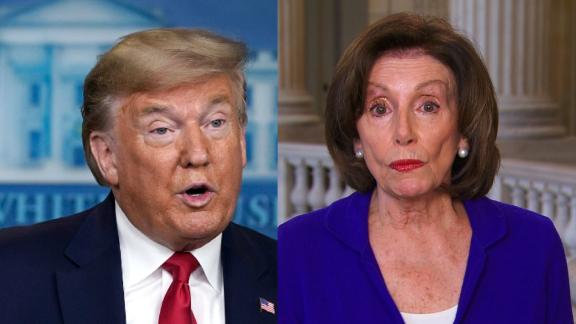Schumer wants to deal with coronavirus crisis before talking infrastructure recovery plan

Top Senate Democrat Chuck Schumer on Wednesday dismissed the President’s proposal of a $2 trillion infrastructure plan to counteract the coronavirus’ economic effects, characterizing the effort as premature compared to the health care crisis triggered by the virus.
When asked by CNN’s Erin Burnett whether he gave President Donald Trump credit for his willingness to make such a hefty investment, Schumer replied, “I’d have to say seeing is believing.”
“We once asked him for that amount, Speaker (Nancy) Pelosi and I in the White House, and he sort of got up and walked out. So let’s wait and see. Our immediate problem is dealing with the health care crisis,” the New York Democrat added.
“Infrastructure is good — I’m all for it, that’s when we try to heal the economy,” Schumer said. “But until we get this crisis in order, the economy will get worse and worse and worse because people won’t be at their jobs, people will be stuck in their homes.”
Schumer called “a dramatic shortage of all the needed supplies” for those fighting the virus “one of the greatest problems we face,” lamenting that “we have no one really in charge — we have this awful spectacle of governors bidding against one another.”
As hospitals reel from the growing number of coronavirus cases, Schumer’s comments highlight two key story lines in the ongoing federal response — state governors facing varying degrees of resistance in their requests for much-needed protective equipment from the federal government and Capitol Hill lawmakers and Treasury Secretary Steven Mnuchin hashing out a fourth coronavirus spending package.
Republicans are watching to see what happens before jumping into “Phase 4” negotiations. There are some reasons for that, not the least of which is the fact that the government still has to figure out how to disburse the last $2 trillion.
Senate Majority Leader Mitch McConnell has made it clear in interviews this week that he wants to see the impact of the third stimulus bill before negotiating a fourth stimulus package.
“What I disagree with the speaker on is she is already saying we need to work on Phase Four. Well look, the current law has not been in effect for even a week … (we) may need a Phase 4, but we are not even fully into Phase 3,” McConnell said in a radio interview Wednesday morning.
House Democrats, including Pelosi, meanwhile, have already started their push, talking to their conference about priorities including more payments to individuals, more money for states and for hospitals.
Part of Pelosi’s focus on a “Phase 4” is based on internal Demcoratic politics, as the California Democrat had to lean on her caucus to vote for the last package despite the fact that it did not include everything Democrats had wanted. Her pitch then was “Phase 4” is around the corner, just vote for “Phase 3,” and more Democratic priorities would be in the next package.
Democrats saw an opening on infrastructure on Tuesday after Trump tweeted his support for a package. House Ways and Means Chairman Richard Neal has been talking to Mnuchin about this since December, and when Neal spoke with CNN on Tuesday, he was optimistic infrastructure could be a part of “Phase 4”. But, Republicans aren’t there yet and while he acknowledges that, he hopes GOP lawmakers will get on board.
Schumer also disparaged Trump’s choice of Peter Navarro as the federal government’s national policy coordinator for the Defense Production Act, which gives the government more control during emergencies to direct industrial production. Trump invoked the act last week to compel General Motors to produce more ventilators for increasing coronavirus hospitalizations.
Navarro “is not up to the job,” Schumer said. “He’s a very nice man, but he has had no experience doing things like this, and they have no one that I can best tell in charge of the distribution.”
Schumer called on the administration to select “one person, a military person, a general who knows how to deal with logistics and order mastering, who knows command and control.”
That person should be “in charge of both production and distribution of all the kinds of needed equipment and get it to the places that need it and have shortages,” Schumer said, recommending that General Mark Milley, chairman of the Joint Chiefs of Staff, could select a strong candidate for the role.
